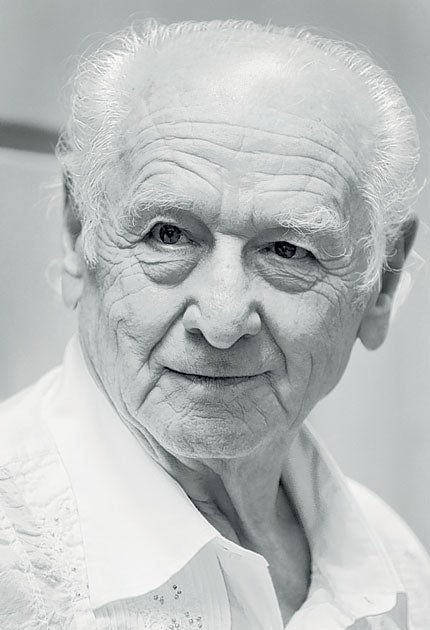Arnost Lustig: Survivor of three Nazi concentration camps who became an award-winning author and academic

It is no surprise that Arnost Lustig made the Holocaust the main theme of his works, as many members of his family were among the millions of victims.
Born into a middle-class Prague family, in the new state of Czechoslovakia, Lustig was 12 when German troops marched in in March 1939. There 92,000 Jews living in Prague at that time, roughly 20 per cent of the population. Antisemitic policies were soon introduced. Lustig, with other Jews, was expelled from his technical school.
In 1942, together with thousands of others, Lustig and his family were sent to Terezin (Theresienstadt). In this 18th-century former Austrian fortress Czech, German and Austrian Jews, and later others from other Nazi-occupied states, faced overcrowding, hunger, disease and hard labour.
Among them were some of the cream of the European intelligentsia. Most were later sent to Auschwitz, or other extermination camps, to die in the gas chambers or through slave labour. Lustig survived, only to be sent, as the Red Army approached, to Buchenwald. As the Third Reich shrank, with the Allied advance, in 1945, he and other survivors entrained for Dachau concentration camp in Bavaria. The locomotive carrying them was mistakenly destroyed by an American plane; somehow, Lustig found the strength and the means to return to Prague, where on 5 May 1945 he took part in the revolt of Prague's population against the German garrison.
After the war, Lustig found that, remarkably, his mother and sister had survived. He studied journalism at Prague's ancient Charles University and on graduation worked for a number of years at Radio Prague. At the time of the Israeli-Arab war of 1948 he was assigned to Israel. From 1948 to 1956 he worked as a radio correspondent for the Czechoslovak radio in Europe, Asia, and North America. He was one of the major critics of the Communist regime, in June 1967, at the 4th Writers Conference, and gave up his membership of the Communist Party after the 1967 Middle East war in protest at his government's breaking of relations with Israel.
Siding with the reformist "Socialism with a human face" of Alexander Dubcek, he left Czechoslovakia after the Soviet-led invasion in August 1968 which put paid to that brief experiment. After stays in Israel and Tito's Yugoslavia, where he worked in a Zagreb film studio, he found sanctuary in the United States. He was employed at Drake University in Des Moines, Iowa and, from 1973 to 2003, served as professor for film and literature at the American University in Washington, DC. In 2003 he returned to live in Prague. The then President, Vaclav Havel, allocated him an apartment in Prague Castle. Lustig was honoured for his contribution to Czech culture on his 80th birthday in 2006.
Lustig began to get his work published in the late 1950s with Noc A Nadeje (Night and Hope, 1958, English translation 1985, a collection of short stories focusing on the lives of several individuals incarcerated in Theresienstadt. Among them is an old woman who runs a junk shop and who receives a gift of two boiled potatoes from an elderly gentleman suitor, and a young boy who organises a plot to raid a secret food hoard to ingratiate himself with the boys in his dormitory. It was later filmed in Czech.
Among his other well-known works are Diamonds of the Night (1958), Dita Saxova (1962), A Prayer for Katerina Horowitzova (1964), The Unloved: From the Diary of Perla S (1979), and Lovely Green Eyes (2004). He wrote many other novels, stories and essays some of which were translated into German and English.
In Lovely Green Eyes, Hanka , a 15-year-old Jewish girl from Prague, is transported to Auschwitz, where her family die, but she is employed as a hospital cleaner. The doctor Hanka works for has fled in disgrace for transplanting "sub-human" Jewish skin onto a German soldier suffering from frostbite. In fear as a witness to the doctor's "crime", she volunteers for the German field brothel, lying about her age and ethnicity. Passing for an 18-year-old Aryan with cropped ginger hair and green eyes, Hanka soon finds herself in Feldpost No. 232 Ost, where she is named "Lovely Green Eyes" by her officer client. The book was nominated for a Pulitzer Prize in 2003.
In 1994, Lustig received a literary award from the American Academy of Arts and Letters for exceptional accomplishment, and was awarded the Franz Kafka Prize in 2008. Among his other awards were: the Locarno Film Festival Prize in 1963, the Monte Carlo Film Festival Prize in 1966, the Czechoslovak Radio Corporation Prize in 1966 and 1967, the Gottwald Prize in 1967, the B'nai B'rith prize in 1974 and the National Jewish Book award in 1980 for Dita Saxova.
Lustig was married to the former Vera Weislitzová, the daughter of a furniture maker from Ostrava who was also imprisoned in the Terezí* ghetto. Unlike her parents, she was not deported to Auschwitz. She wrote of her family's fate during the Holocaust in a collection of poems.
Arnost Lustig, writer: born Prague 21 December 1926; married 1927 Vera Weislitzová (one son, one daughter); died Prague 26 February 2011.
Join our commenting forum
Join thought-provoking conversations, follow other Independent readers and see their replies
Comments